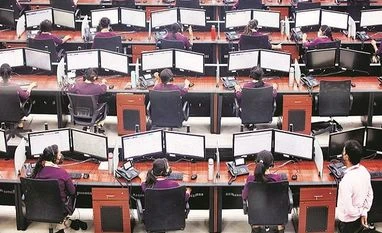Post Covid-19, a third wave of IT outsourcing after the previous ones in the year 2000 and 2008 is expected, which would benefit Indian IT companies and tech jobs.
Marquee financial services house, Goldman Sachs said in a report, "Post Covid-19, we expect a third wave of outsourcing and an increasing number of technology roles globally finding their way to India as work from anywhere becomes the new accepted norm".
"With the most efficient supply chains, we believe India IT services companies are positioned favourably to benefit from a third wave of outsourcing after previous waves in 2000 (post Y2K) and in 2008-09 (post Global Financial Crisis)", said Goldman Sachs.
Due to these tailwinds and given estimates of further increase in Global/US GDP estimates on a sharper recovery, Goldman Sachs has increased its FY22E-23E sector revenue and earnings forecasts by up to seven per cent and now forecast 12.6 per cent US dollar revenue growth in FY22E (vs. -2.7 per cent in FY21E, and vs. prior 9.7 per cent) for the top five Indian IT firms. "These changes are supported by our IT services demand tracker (link) and management/expert commentaries during our India corporate day", it said.
In the past, major crises have tended to lead to a sharp increase in outsourcing and even offshoring particularly to India, which has consistently experienced much lower wage levels for technology developers compared to the Developed Markets (DMs), amid an increasing annual base of engineering graduates.
Goldman Sachs said the first such wave happened after the Y2K problem in 2000 when India's IT industry was growing at more tan 40 per cent from a small base and very low global penetration, driven largely by labour cost arbitrage.
More From This Section
A second wave started post GFC in 2008-09 when India's IT industry grew at more than 15 per cent consistently for three to four years before the growth normalised to high single digits.
This happened both due to a shift to cloud based infrastructure and the higher use of automation tools, forcing Indian IT firms to look for new ways to sell IT solutions, shifting from labour cost arbitrage to business transformation through digital technologies.
Goldman Sachs expects that post Covid-19, a third wave of outsourcing and an increasing number of technology roles globally finding their way to India as Work From Anywhere becomes the new accepted norm.
As per various global surveys, several top firms are planning to have a few of their employees work from home permanently, and in a recent expert call with McKinsey, a few large IT contracts were noted as having as high as 75 per cent of employees engaging in Work From Home.
TCS is planning to have 75 per cent of its employees working from home permanently by 2025 estimated and TechM is gearing for 25-30 per cent of its employees working from home by 2021 estimated on a rotational basis, Goldman Sachs said.
"This strategy, we believe would bring certain permanent cost advantages to the IT services firms around lower rental, facility expenses, including electricity, maintenance/repair and even lower capex around land/building required for extra seating arrangements. Some of these benefits though may be offset by additional capex for home IT infrastructure like desktops, more robust wireless/broadband networks and cyber-security tools", it added.
Digitally skilled employees in India have grown exponentially at 37 per cent CAGR FY17-FY19, making India the largest hub and potentially the biggest beneficiary under the Work from Anywhere norm. "We believe these digitally trained employees at Indian IT firms are likely to drive overall revenue growth, which would be the key reason for their increasing relevance amid the requirement for digital-at-scale solutions", the report said.
"We see TCS as one of the largest beneficiaries of these trends given its wide array of services/capabilities, geographic presence, wide client base, consistent strong execution and ability to work remotely at a large scale with 450K employees", it said.
(Sanjeev Sharma can be contacted at sanjeev.s@ians.in)
--IANS
san/dpb
)